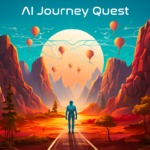In an era of technological marvels and rapid advancements,
artificial intelligence (AI) stands at the forefront, promising transformative
changes across industries and society. Yet, this promising innovation comes
with a pressing concern: the ethical implications of AI deployment. As AI’s
capabilities expand, a comprehensive ethical framework becomes increasingly
urgent. In this post I will explore the
ethical landscape that lies before us.
The Ethical Paradox of AI: Power and Responsibility
AI systems, fueled by massive data and intricate algorithms, have the potential to enhance efficiency, solve complex problems, and even save lives. However, this immense power also raises significant ethical dilemmas. As AI systems make decisions that impact people’s lives, it becomes crucial to ensure that they are unbiased, fair, and aligned with human values.
Challenges in AI Ethics
1. Bias and Fairness: AI systems can inadvertently perpetuate biases in the data based on their training. These biases can lead to discriminatory outcomes, affecting hiring, lending, and law enforcement. Striking a balance between using historical data and ensuring fairness is a challenging ethical consideration.
2. Transparency and Accountability: As AI systems become more complex, some algorithms’ “black box” nature raises questions about transparency. Understanding how AI arrives at its decisions is critical for accountability, particularly in sectors like healthcare and autonomous vehicles.
3. Privacy and Data Usage: AI’s efficacy often relies on extensive data collection, leading to concerns about user privacy. Striking a balance between data utilization and individuals’ rights to privacy is a constant ethical struggle.
4. Job Displacement: While AI can create new opportunities, it also has the potential to displace jobs through automation. Ethical considerations include ensuring a just transition for affected workers and minimizing socioeconomic disparities.
5. Autonomous Systems: The rise of AI in autonomous vehicles and weaponry raises questions about the ethics of machines making life-or-death decisions. Who is accountable when autonomous systems fail, and how can we ensure they prioritize human safety?
Solutions on the Ethical Horizon
1. Diverse and Inclusive Development Teams: Bringing diverse perspectives into AI development can help identify and mitigate biases while creating algorithms and models.
2. Ethical Guidelines and Regulations: Governments, industry leaders, and research organizations are working to establish ethical guidelines and regulations for AI development and deployment. These frameworks can help set standards for fairness, transparency, and accountability.
3. Bias Detection and Mitigation: Researchers are developing tools and techniques to identify and rectify bias in AI systems. These tools and techniques include auditing algorithms for bias and adjusting them to ensure equitable outcomes.
4. Explainable AI: Efforts are underway to create AI systems that provide transparent explanations for their decisions. These systems can enhance accountability and build trust between humans and AI.
5. Data Privacy Measures: Stricter data privacy regulations and decentralized data ownership models can empower individuals while still enabling AI advancements.
6. Ethics Education: Training AI professionals and stakeholders in ethical considerations are essential. AI education should emphasize the potential consequences of AI applications and encourage responsible development.
A Call for Collaborative Action
The ethical journey of AI isn’t a solitary endeavor. Governments, industries, academia, and civil society must collaborate to craft a comprehensive ethical framework that guides AI development and deployment. By prioritizing transparency, fairness, and human-centric values, we can ensure that AI technologies are used for the collective good.
As we navigate the uncharted waters of AI ethics, it’s crucial to recognize that this endeavor isn’t a hindrance to progress; instead, it’s an assurance that the powerful tools we create are aligned with the betterment of humanity. Not only does AI have the potential to transform industries, but it also has the potential to revolutionize the way we approach ethics, empathy, and the preservation of our shared values in an increasingly AI-augmented world.











